Shorter news and links on the COVID-19 pandemic for Darien:
SUNDAY State Statistics on COVID-19 Cases in Lower Fairfield County
Sunday, April 5, 9:25 p.m. — According to New Canaan Emergency Management Director Mike Handler, New Canaan actually has had 82 people testing positive for COVID-19, and 10 deaths (including two on Sunday).
9:20 p.m. — As of Sunday, an even 100 Darienites (six more than the day before) have been identified with COVID-19, according to information released by state authorities. (Reminders: Many people are thought to have the COVID-19 virus who aren’t identified; the state says “all figures are preliminary and subject to change.”)
Here’s the number of identified cases in nearby communities, according to the state government Coronavirus statistics updates Web page:
Stamford — 652 (48 more than the day before)
Norwalk — 503 (39 more than the day before)
New Canaan — 65 (three more than the day before)
Greenwich — 196 (five more than yesterday)
Westport — 135 (the same as the day before; no additional cases)
Wilton — 73 (three more than the day before)
Weston — 32 (the same as the day before; no additional cases)
Ridgefield — 101 (eight more than the day before)
Fairfield — 70 (four more than the day before)
Bridgeport — 163 (13 more than the day before)
TOP TEN MUNICIPALITIES (with total cases): 1. Stamford (652), 2. Norwalk (503), 3. Danbury (470), 4. Waterbury (236), 5. New Haven (234), 6. Greenwich (196), 7. Bridgeport (163), 8. Westport (135), 9. Hartford (125), 10. Shelton (113).
Ridgefield (101) ranks 11th; Darien (100) ranks 12th in the state.

Image from state government website
As of April 5, 2020
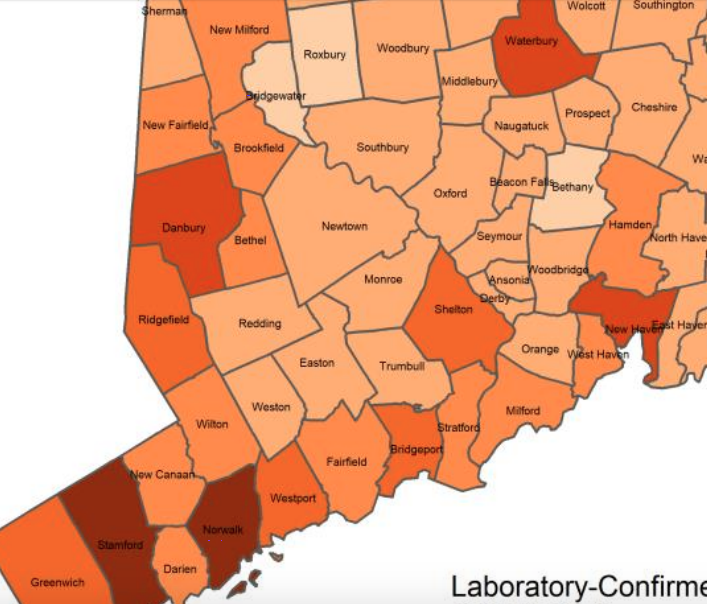
Image from the state government website
Southwestern Connecticut (detail of the map above), as of April 5, 2020
SUNDAY COVID-19 Briefing by Gov. Lamont
Sunday, April 5, 9:03 p.m. — As the State of Connecticut continues taking actions in response to the global spread of coronavirus disease (COVID-19), Governor Ned Lamont provided the following updates as of 4 p.m. on Sunday, April 5, 2020:
Data updates on testing in Connecticut
Since yesterday’s update, an additional 399 Connecticut residents have tested positive for COVID-19, bringing the statewide total to 5,675. To date, more than 23,270 tests have been conducted in Connecticut among both state and private laboratories. Approximately 1,142 patients have been hospitalized. The total statewide total number of COVID-19 associated fatalities is 189.
A county-by-county breakdown includes:
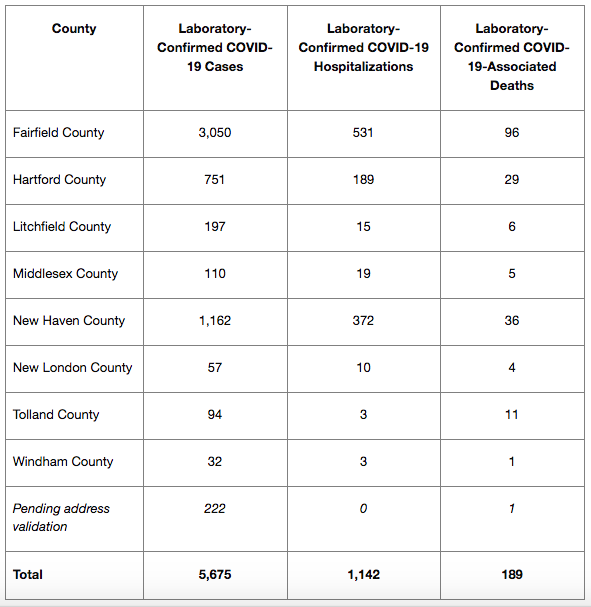
For several additional graphs and tables containing more data, including a list of cases in every municipality and data broken down by age, gender, race, and other factors, visit ct.gov/coronavirus.
Governor Lamont signs 22nd executive order to mitigate the spread of COVID-19
Governor Lamont today signed another executive order – the 22nd since he enacted the emergency declarations – that builds upon his efforts to encourage mitigation strategies that slow down transmission of the virus.
Governor Lamont’s Executive Order No. 7U enacts the following provisions:
- Protection from civil liability for actions or omissions in support of the state’s COVID-19 response: Protects health care professionals and health care facilities, including nursing homes and field hospitals, from lawsuits for acts or omissions undertaken in good faith in support of the state’s COVID-19 response. State statutes already provide similar protections for other first responders, including police, firefighters, and EMS.
- Financial protections for the uninsured and people covered by insurance who receive out-of-network health care services during the public health emergency: Protects those who are uninsured and those who are insured and are treated by an out-of-network emergency services health care provider from surprise bills and other significant costs. This will ensure that individuals receiving care are not being financially burdened.
| **Download: Governor Lamont’s Executive Order No. 7U |
Access Health CT continues enrolling residents in health insurance plans under new special enrollment period
Access Health CT – Connecticut’s health insurance marketplace – is continuing to enroll uninsured residents in health plans under a new special enrollment period that was created due to the exceptional circumstances surrounding the COVID-19 pandemic. The special enrollment period began on March 19 and was initially scheduled to end on April 2 but was recently extended to April 17.
To date, Access Health CT has processed 3,530 enrollments into qualified health plans during this period. A total of 1,498 of those enrollments were made possible by the new special enrollment period offered in partnership with Connecticut’s health insurance companies. This is in addition to 15,518 HUSKY enrollments during the same period.
Coverage for anyone who enrolled during between March 19 and April 2 began on April 1. Anyone who enrolls between April 3 and April 17 will have coverage that takes effect May 1. Customers are reminded that anyone currently enrolled in qualified health plans through Access Health CT may be able to update their income and increase the amount of financial assistance for which they qualify.
To learn more about how to enroll, visit learn.accesshealthct.com.
Providing information to Connecticut residents
For the most up-to-date information from the State of Connecticut on COVID-19, including an FAQ and other guidance and resources, residents are encouraged to visit ct.gov/coronavirus.
Individuals who have general questions that are not answered on the website can also call 2-1-1 for assistance. The hotline is available 24 hours a day and has multilingual assistance and TDD/TTY access. It intended to be used by individuals who are not experiencing symptoms but may have general questions related to COVID-19. Anyone experiencing symptoms is strongly urged to contact their medical provider.
SATURDAY State Statistics on COVID-19 Cases in Lower Fairfield County
Saturday, April 4, 8:28 p.m. — As of Saturday, 94 Darienites (three more than the day before) have been identified with COVID-19, according to information released by state authorities. (Reminders: Many people are thought to have the COVID-19 virus who aren’t identified; the state says “all figures are preliminary and subject to change.”)
Here’s the number of identified cases in nearby communities, according to the state government Coronavirus statistics updates Web page:
Stamford — 604 (94 more than the day before)
Norwalk — 464 (29 more than the day before)
New Canaan — 62 (one more than the day before)
Greenwich — 191 (two more than yesterday)
Westport — 135 (one more than the day before)
Wilton — 70 (one LESS than the day before — an adjustment from a previous mistake?)
Weston — 32 (the same as the day before; no additional cases)
Ridgefield — 93 (five more than the day before)
Fairfield — 66 (four more than the day before)
Bridgeport — 150 (35 more than the day before)
TOP TEN MUNICIPALITIES (with total cases): 1. Stamford (604), 2. Norwalk (464), 3. Danbury (418), 4. Waterbury (217), 5. Greenwich (191), 6. New Haven (190), 7. Bridgeport (150), 8. Westport (135), 9. Hartford (125), 10. Ridgefield (93).
Gov. Lamont’s SATURDAY COVID-19 Briefing
Saturday, April 4, 7:16 p.m. —As the State of Connecticut continues taking actions in response to the global spread of coronavirus disease (COVID-19), Governor Ned Lamont provided the following updates as of 4 p.m. on Saturday, April 4, 2020:
Data updates on testing in Connecticut
Since yesterday’s update, an additional 362 Connecticut residents have tested positive for COVID-19, bringing the statewide total to 5,276. To date, more than 22,029 tests have been conducted in Connecticut among both state and private laboratories. Approximately 1,033 patients have been hospitalized. The total statewide total number of fatalities is 165.
A county-by-county breakdown includes:
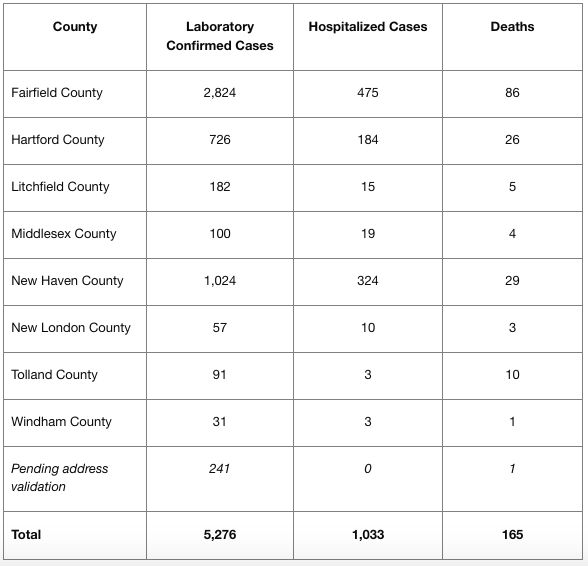
Image from the state government website
Saturday, April 4, 2020 COVID-19 statistics in Connecticut counties
For several additional graphs and tables containing more data, including a list of cases in every municipality and data broken down by age, gender, race, and other factors, visit ct.gov/coronavirus.
FEMA approves Lamont administration’s request to include domestic violence survivors in non-congregate housing guidelines
FEMA today notified the state that it has approved the Lamont administration’s request to add housing for survivors of domestic violence in the reimbursement guidelines it previously approved for Connecticut, which authorized the state and municipalities to receive a 75 percent reimbursement for the costs associated with providing non-congregate housing first responders and health care workers who temporarily need a place to live separate from family or roommates, and also for those who are homeless.
“Ensuring safe housing for survivors of domestic violence in locations that are less congested than what many of the locations that typically offer these services usually provide is critical at this time, and I thank FEMA for approving our request to cover these services,” Governor Lamont said.
Connecticut’s schools have served more than one million meals under emergency programs
As of Friday afternoon, Connecticut’s public schools have served more than one million meals under the emergency meals programs the State Department of Education launched last month in response to Governor Lamont’s order for classes at schools to be canceled statewide. A total of 128 school districts are serving meals at 407 locations.
In accordance with federal requirements, the state is operating two emergency meals programs to ensure children do not go hungry during this crisis:
- Under one program, certain school districts are authorized to serve meals only to students who attend their schools or any other child 18 years of age and younger residing in the same household.
- Under the other program, certain school districts are authorized to serve meals to any child 18 years of age and younger, regardless of which town or city the child lives or what school they attend.
Households should check with the individual school districts for information on the time and location the meals are being served, and further guidance regarding their distribution.
Connecticut’s Tourism Office promotes local restaurants offering take-out and delivery services, provides virtual at-home activities
The State of Connecticut’s Tourism Office has shifted its focus from its usual promotional activities to adjust to the public health emergency and Governor Lamont’s order for residents to “Stay Safe, Stay Home.”
The state’s official tourism website, CTVisit.com, has been adapted to reflect this new reality and is featuring a number activities residents can either do in secluded locations or safely at home through virtual experiences. This includes the creation of a list of restaurants, breweries, and vineyards that are now offering take-out and delivery services; and also a collection of online, virtual experiences about Connecticut landmarks, museums, and attractions that provide educational opportunities to engage children while staying safe at home.
Providing information to Connecticut residents
For the most up-to-date information from the State of Connecticut on COVID-19, including an FAQ and other guidance and resources, residents are encouraged to visit ct.gov/coronavirus.
Individuals who have general questions that are not answered on the website can also call 2-1-1 for assistance. The hotline is available 24 hours a day and has multilingual assistance and TDD/TTY access. It intended to be used by individuals who are not experiencing symptoms but may have general questions related to COVID-19. Anyone experiencing symptoms is strongly urged to contact their medical provider.
Gov. Lamont’s FRIDAY COVID-19 Briefing
Saturday, April 4, 7:38 a.m. — As the State of Connecticut continues taking actions in response to the global spread of coronavirus disease (COVID-19), Governor Ned Lamont provided the following updates as of 7 p.m. on Friday, April 3, 2020:
Data updates on testing in Connecticut
Since yesterday’s update, an additional 1,091 Connecticut residents have tested positive for COVID-19, bringing the statewide total to 4,915. To date, more than 20,015 tests have been conducted in Connecticut among both state and private laboratories. Approximately 909 patients have been hospitalized. The total statewide total number of fatalities is 132.
A county-by-county breakdown includes:
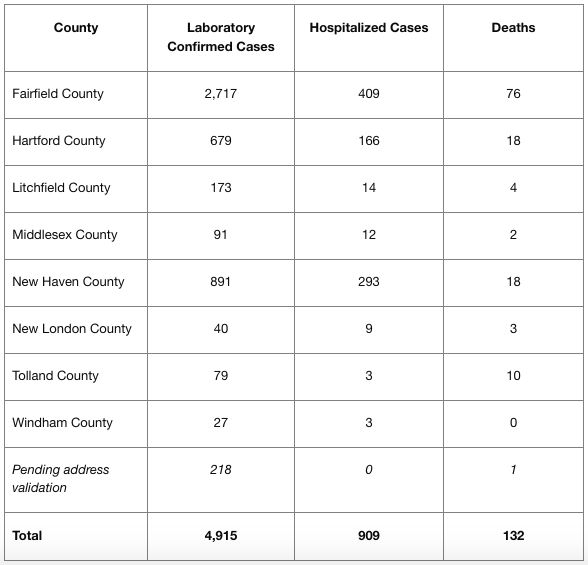
Connecticut COVID-19 statistics by county, released April 3.
For several additional charts and tables containing more data groups, including a town-by-town breakdown of positive cases in each municipality and a breakdown of cases and deaths among age groups, visit ct.gov/coronavirus.
Governor Lamont announces extensive measures to support Connecticut’s long-term care facilities, staff, and residents
Governor Lamont today announced that the state’s 213 nursing homes are receiving a 10 percent across-the-board increase in Medicaid payments to help meet extraordinary costs from the public health emergency. The payment increase will be applied toward employee wages, including staff retention bonuses, overtime, and shift incentive payments; and new costs related to screening of visitors, personal protective equipment, and cleaning and housekeeping supplies.
The 10 percent funding increase runs from April 1 through June 30, with an initial payment of $11.6 million scheduled to be received by nursing homes on April 7. The three-month increase is expected to total $35.3 million. In addition, the state is offering to assist with start-up costs and to make $600 per-day payment to all facilities that are designated by the Department of Public Health as suitable to be re-opened for the purpose of serving residents with COVID-19 and who need nursing home level of care.
“We will do everything possible to protect the health and safety of our family, friends and neighbors in nursing homes – and the health and safety of the faithful, dedicated and skilled staff members who care for them,” Governor Lamont said. “Together with nursing home industry and union representing many of the men and women on the front line of care, my administration is working on a number of levels to support and fund high-quality health care services during this pandemic and beyond.”
For more information, read the press release issued today by Governor Lamont.
Governor Lamont urges volunteers from the general public to participate in Connecticut’s COVID-19 response efforts
Governor Lamont and a large number of state officials and nonprofit providers are urging Connecticut residents to consider taking on a volunteer role in their communities to help respond to the COVID-19 crisis. While the state already began a campaign seeking out volunteers who have health care experience, today the state is launching a campaign seeking volunteers from the general public who are needed for other services at many different types of providers, such as food banks, deliveries to the elderly, shelters, and more.
The governor stressed that the COVID-19 outbreak is having a wide-ranging impact, and that means a large amount of skill sets are required to ensure that every community in Connecticut has the resources they need to combat this pandemic.
“During times like this, it is critical that we come together as a community – as a family – and support our neighbors in this response effort,” Governor Lamont said. “Connecticut residents and businesses have been incredibly generous in offering to do what they can to meet the needs of our state at this challenging time. Our frontline providers at food banks, meal delivery services, and shelters need extra help right now, and that is why we are asking for more volunteers to step forward. I am grateful to everyone who has already pitched in to support Connecticut families. The way we’ll get through this public health emergency is by working together.”
Volunteers from the general public will be matched with a community provider in need. Here are the basics:
- Volunteers must be 18 or older, and should not volunteer if at risk or compromised. Those who are immunocompromised, over 60, showing symptoms of COVID-19, or live with or care for someone in any of those categories should avoid being in public, including for volunteer efforts. Please stay safe, stay home.
- Volunteers do not need to be health care workers. In addition to calling on physicians, nurses, and other medical professionals who may be retired, the state needs community members to help out at food banks, food deliveries to the elderly, and at shelters in a number of ways.
- For those who do have a background in health care, the state’s medical community has specific needs at this time. Hospitals have advised the state that they have a high need for critical care nurses and repository therapists.
- Every effort is being made to keep volunteers safe. The state and all of the organizations involved are working hard to make sure that everyone helping out can do so as safely as possible. If any volunteers have concerns, they are strongly urged to ask about the safety protocols of the organization they are volunteering.
- Volunteers will be sent where they are most needed and feel most comfortable. The volunteer process is centralized so that the state and participating organizations have a clear picture of everyone who can help, and everything that is needed. That way, volunteers can be matched with an opportunity that is most in need of that person’s skillset.
The Lamont administration and the State of Connecticut are grateful to the National Voluntary Organizations Active in Disasters (VOAD), which has made the Disaster Assistance Response Technology database available to help manage the statewide volunteer effort for this emergency, as well as the Connecticut VOAD chapter for their support.
Those interested in volunteering should visit ct.gov/coronavirus for information on how to register.
For more information, read the press release issued today by Governor Lamont.
Connecticut Labor Department provides updates following number of unemployment benefits applications
The Connecticut Department of Labor (CTDOL) has processed more than 90,000 of the over 250,000 unemployment claims filed in less than three weeks by residents impacted by the COVID-19 pandemic. The number of claims recently received far exceeds the amount the agency typically receives in one year.
While the numbers are staggering, they are not unique to Connecticut. Unemployment claims are up in record numbers across the country, and everyone is doing their best to process claims as quickly as possible. Nationwide, approximately 6,648,000 seasonally adjusted initial claims were filed for the week ending March 28, an increase of 3,341,000 from the previous week. This marks the highest level of seasonally adjusted initial claims in the history of the seasonally adjusted series.
“The agency is working diligently to serve its residents and appreciates the public’s patience as it works to process the thousands of claims that have been filed as a result of the pandemic,” Labor Commissioner Kurt Westby said. “We want to let people know that although it will take some time, all eligible claims will be processed, paid, and retroactive to the date they were filed.”
Agency employees are working overtime and weekends to ensure benefits are paid as quickly as possible. Westby said the estimated backlog is approximately five weeks. More than 80 employees are processing claims – a significant increase from the 20 typically processing new applications – and additional staff will continue to be trained to assist in the upcoming days and weeks.
To speed up the processing of their claims, unemployed residents who have not yet filed should:
- Visit www.filectui.com
- Click the link that says “For quicker payment of unemployment benefit, please follow these instructions”
- Information will be provided on filing claims as a “Temporary Shutdown” option and provide guidance on entering a return to work date.
For residents that have already filed a claim, Westby noted that it is very important they they check their email (including junk and spam folders) daily for updated messages from CTDOL. Messages may include next steps or a request that claimants log back onto their claim since following these instructions will help speed up processing.
For additional information read the list of Frequently Asked Questions the agency created related to the COVID-19 pandemic.
As part of the CARES Act that was approved by Congress last week, CTDOL is also tasked with administering several federal stimulus unemployment benefit programs. The agency is fortunate to be part of the ReEmployUSA five-state consortium made up of Connecticut, Maine, Rhode Island, Mississippi, and Oklahoma. Although the state joined the consortium to build a new benefits system more quickly, it is now lending its expertise to help develop necessary programming that will provide the federal benefit programs more quickly.
“Our employees appreciate the support we have received from the public, the Governor’s Office, and other agencies, including technical support from BEST and human resource help from the Department of Administrative Services. The agency has helped people survive economic recessions, but this is the first pandemic we have faced when providing unemployment benefits. We know bills need to be paid and how important it is to provide this economic lifeline to our residents.”
State reminds businesses that small businesses can apply for federal assistance under the recently adopted CARES Act
Governor Lamont, Department of Economic and Community Development Commissioner David Lehman, and Department of Banking Commissioner Jorge Perez are encouraging small businesses and sole proprietors to reach out directly to their banks and credit unions to apply for the federal Paycheck Protection Program (PPP). The program was recently created by Congress as part of the CARES Act to respond to the nationwide COVID-19 crisis.
Administered by the U.S. Small Business Association (SBA), the program authorizes up to $349 billion in forgivable loans to small businesses that keep all their employees on the payroll for eight weeks and can use the money for payroll, rent, mortgage interest, or utilities. Seventy-five percent of the money must be used for payroll.
Businesses and sole proprietorships should contact their banks and credit unions directly to access the loans. They should also closely review the information and application form for borrowers on the U.S. Treasury Department’s website prior to contacting their banks and credit unions. This will help identify the documents needed to collected and present during the application process.
Commissioner Perez is reminding those involved that since this is a brand new program that is still under development by the federal government, it may take a bit longer than anticipated as the first several days are expected to be very busy.
Additional information about PPP can be read on SBA’s website.
Providing information to Connecticut residents
For the most up-to-date information from the State of Connecticut on COVID-19, including an FAQ and other guidance and resources, residents are encouraged to visit ct.gov/coronavirus.
Individuals who have general questions that are not answered on the website can also call 2-1-1 for assistance. The hotline is available 24 hours a day and has multilingual assistance and TDD/TTY access. It intended to be used by individuals who are not experiencing symptoms but may have general questions related to COVID-19. Anyone experiencing symptoms is strongly urged to contact their medical provider.
FRIDAY State Results COVID-19 Cases in Lower Fairfield County
Friday, April 3, 5:15 p.m. — As of Friday, 91 Darienites (14 more than the day before) have been identified with COVID-19, according to information released by state authorities. (Reminders: Many people are thought to have the COVID-19 virus who aren’t identified; the state says “all figures are preliminary and subject to change.”)
Here’s the number of identified cases in nearby communities, according to the state government Coronavirus statistics updates Web page:
Stamford — 508 (71 more than the day before) (highest number in CT)
Norwalk — 435 (105 more than the day before) (second highest in CT)
New Canaan — 61 (10 more than the day before)
Greenwich — 189 (19 more than yesterday) (fourth highest number in CT — Danbury is third)
Westport — 134 (nine more than the day before) (sixth highest in CT — New Haven is fifth)
Wilton — 71 (20 more than the day before)
Weston — 32 (three more than the day before)
Ridgefield — 88 (10 more than the day before)
Fairfield — 62 (11 more than the day before)
Bridgeport — 115 (10 more than the day before)
- See charts here with more extensive information on Darien COVID-19 test results.
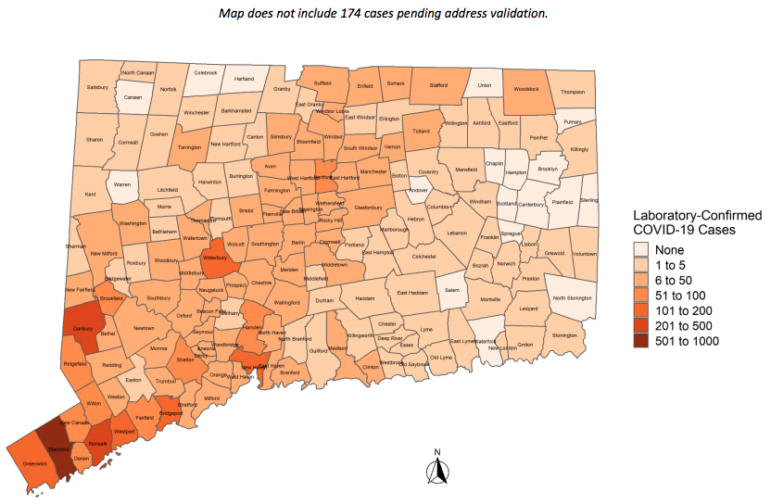
Image from state government website
For Friday, April 3, 2020

Image from the state government website
Closer view of hte map just above, showing southwestern Connecticut towns, comparing known COVID-29 cases
Darien Parks & Rec Makes It Official: All Spring Programs Cancelled
Friday, April 3, 3:07 p.m. —A short announcement posted Friday on the department’s web page:
- 4/3/2020 – Spring Program Update
- All spring programs that were scheduled to start in April have been canceled. Refunds will be processed the week of April 6th. We will make a decision on programs scheduled to start in May & June in the coming weeks.
Where Identified COVID-19 Cases Are on THURSDAY in Lower Fairfield County
Friday, April 3, 10:56 a.m. — As of Thursday, 77 Darienites (five more than the day before) have been identified with COVID-19, according to information released by state authorities. (Reminders: Many people are thought to have the COVID-19 virus who aren’t identified; the state says “all figures are preliminary and subject to change.”) Here’s the number of identified cases in nearby communities, according to the state government Coronavirus statistics updates Web page:
Stamford — 508 (71 more than the day before) (highest number in CT)
Norwalk — 330 (15 more than the day before) (second highest in CT)
New Canaan — 51 (eight more than the day before)
Greenwich — 170 (13 more than yesterday) (fourth highest number in CT — Danbury is third)
Westport — 125 (five more than the day before) (sixth highest in CT — New Haven is fifth)
Wilton — 51 (two more than the day before)
Weston — 29 (same as the past two days; no new cases)
Ridgefield — 78 (same as the day before)
Fairfield — 51 (three more than the day before)
Bridgeport — 115 (10 more than the day before)
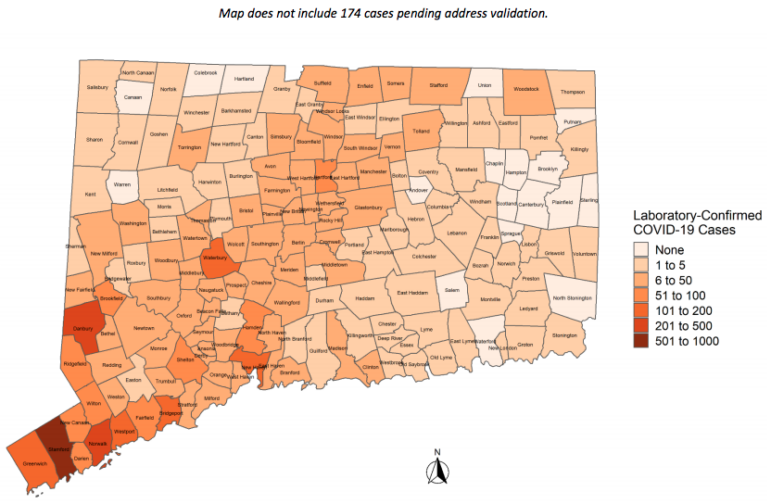
Distribution of identified COVID-19 cases in Connecticut, as of Thursday, April 2.
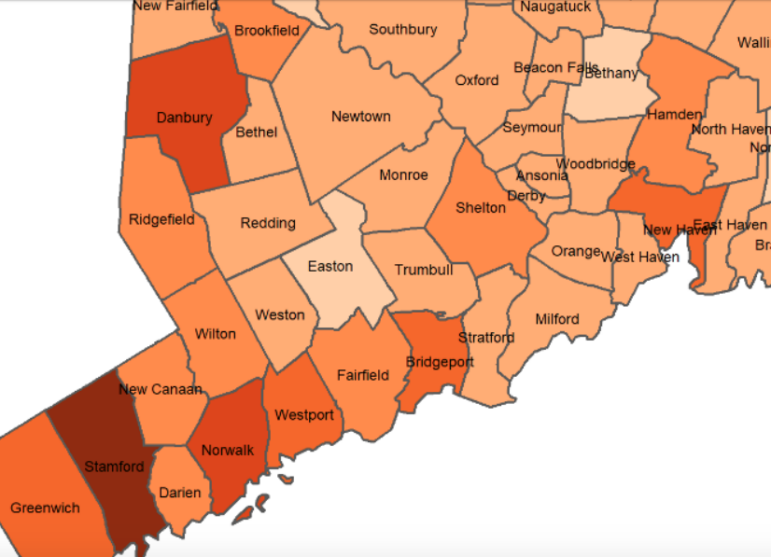
Image from Connecticut state government
Closeup of the map above, showing southwestern Connecticut identified COVID-19 cases, as of Thursday, April 2, 2020.
Gov. Lamont’s THURSDAY COVID-19 Briefing
Added Friday, April 3, 10:28 a.m. — As the State of Connecticut continues taking actions in response to the global spread of coronavirus disease (COVID-19), Governor Ned Lamont provided the following updates as of 7:00 p.m. on Thursday, April 2, 2020:
Data updates on testing in Connecticut
Since yesterday’s update, an additional 267 Connecticut residents have tested positive for COVID-19, bringing the statewide total to 3,824. To date, more than 18,300 tests have been conducted in Connecticut among both state and private laboratories. Approximately 827 patients have been hospitalized. The total statewide total number of fatalities is 112.
A county-by-county breakdown includes:
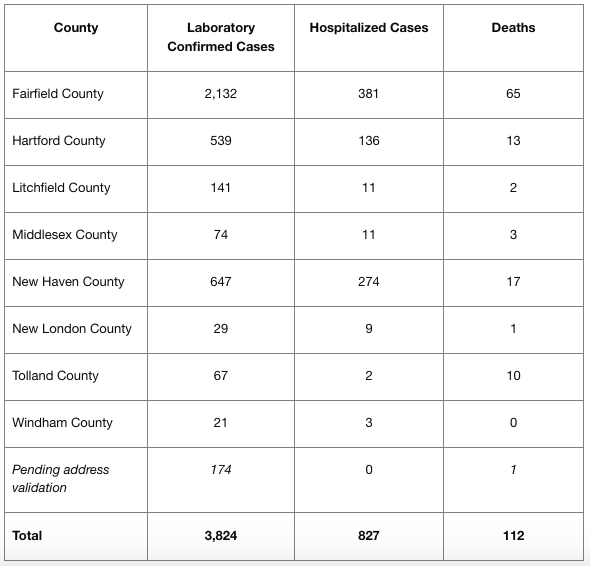
For several additional charts and tables containing more data groups, including a town-by-town breakdown of positive cases in each municipality and a breakdown of cases and deaths among age groups, visit ct.gov/coronavirus.
Governor Lamont signs 21st executive order to mitigate the spread of COVID-19
Governor Lamont today signed another executive order – the 21st since he enacted the emergency declarations – that builds upon his efforts to encourage mitigation strategies that slow down transmission of the virus.
Governor Lamont’s Executive Order No. 7T enacts the following provisions:
- Prohibition on non-essential lodging: Prohibits all hotels, motels, inns, bed and breakfasts, and short-term residential rentals (including those arrange through online hosting platforms such as Airbnb and Vrbo) from renting to customers for leisure or vacation purposes. Instead, lodging at these facilities must be limited to:
- Health care workers, first responders, and other essential workers;
- Workers engaged in transporting critical materials to hospitals;
- Vulnerable populations, including those who are homeless;
- Connecticut residents who need a place to self-quarantine away from family or roommates;
- Those receiving long-term care or specialized medical treatment;
- Connecticut residents in need of housing as a result of property damage, such as a fire;
- Persons unable to return home because of constraints on travel; and
- Persons engaged in providing or servicing lodging.
- Further clarification of limits on restaurants, bars, and private clubs: Permits, under certain conditions, food establishments and liquor manufacturers to deliver alcoholic liquor and allows additional manufacturers to sell alcoholic liquor for pick-up and delivery. This will provide additional opportunities for these businesses to safely deliver their products directly to customers and reduce travel outside the home.
- Suspension of notarization requirement related to Connecticut Recovery Bridge Loan Program: Suspends the notarization requirement for certifying compliance with nondiscrimination laws for applicants seeking assistance through the recently created Connecticut Recovery Bridge Loan Program for small businesses in order to ensure that applications can be completed and processed in an efficient manner.
- Flexibility to maintain adequate child care infrastructure: Provides the commissioner of Early Childhood with the authority to implement a financial package to compensate emergency child care and stabilize the child care field to support providers through the emergency response.
- Suspension of rehearing rights for temporary rate increases for certain health care providers: Enables the Department of Social Services to provide relief to various providers, including nursing facilities, intermediate care facilities for the intellectually disabled, and residential care homes, by way of a temporary rate increase to address the COVID-19 public health emergency without being subject to rehearings challenging the overall magnitude and methodology of the rate increases that can, in some case, take years to come to a conclusion and expose the state to increased costs beyond those necessary to pay the temporary rate increases.
- Alternative to affidavits in relation to orders of protection and relief: Suspends the requirement that victims of domestic abuse sign an application for an order of protection under oath before a notary or attorney. Instead, the order enables them to sign an application outside the presence of a third party under the penalty of false statement. Governor Lamont thanks the Connecticut Coalition Against Domestic Violence and the Judicial Branch for their input and coordination on this important matter. This order, along with additional changes the Judicial Branch intends to make to its Rules of Civil Procedure, will ensure victims of domestic abuse continue to have access to our courts during the COVID-19 pandemic.
| **Download: Governor Lamont’s Executive Order No. 7T |
Access Health CT extends special enrollment period for uninsured residents to April 17
Access Health CT – Connecticut’s health insurance marketplace – today announced that it is extending the deadline for the new special enrollment period for uninsured residents to enroll in health insurance plans. The special enrollment period opened on March 19 and was originally anticipated to end April 2, however that deadline is now being extended to April 17. Anyone who enrolls during this extension period will receive coverage effective May 1.
The only way to sign up for this special enrollment period is by calling 1-855-365-2428. Telephone enrollment is available Mondays through Fridays from 8:00 a.m. to 5:00 p.m.
Individuals who lose coverage due to unemployment, experience certain other qualifying life events, or qualify for Medicaid/Children’s Health Program (CHIP), can always enroll online, in-person or over the phone and all help is free.
Nearly 1,500 people enrolled during the initial-two week special enrollment period.
For more information, read the press release issued today by Access Health CT.
Department of Social Services extends deadline to apply for winter home-heating assistance
The Department of Social Services today announced that it is extending the application period for the Connecticut Energy Assistance Program. Residents will now have until June 1, 2020 to apply for assistance to help cover this past winter’s heating bills (the previous deadline was May 1). For application sites and eligibility information, visit www.ct.gov/staywarm, call 2-1-1, text CTWARM to 898-211, or contact a community action agency.
Department of Social Services extends Emergency SNAP benefits to 97,000 households
The Department of Social Services is providing Emergency Supplemental Nutrition Program (SNAP) benefits to nearly half of Connecticut SNAP participants on April 9 and April 20. Authorized by the federal Families First Coronavirus Response Act of 2020, the extra food benefits will go to approximately 97,000 households not currently receiving the maximum benefits allowed for their household size. This means that all households enrolled in SNAP will receive the maximum food benefit allowable for their household size, even if they aren’t usually eligible for the maximum benefit. For more information visit www.ct.gov/snap.
Department of Revenue Services extends filing payment deadline for gift tax returns
At the direction of Governor Lamont, the Department of Revenue Services today announced that the filing and payment deadline for gift tax returns is being extended until July 15, 2020. Gift tax returns reporting gifts made during 2019 had been due on April 15. This extension does not apply to the estate tax.
“This action, which aligns with the U.S. Treasury’s announcement of an extension at the federal level, will help support taxpayers and tax practitioners meet their responsibility to file returns and remit payments,” Acting Revenue Services Commissioner John Biello said.
For Connecticut taxable gifts made during calendar year 2019, a donor will not pay Connecticut gift tax unless the aggregate amount of the Connecticut taxable gifts made exceeds $3.6 million.
For more information, read the press release issued today by the Department of Revenue Services.
Providing information to Connecticut residents
For the most up-to-date information from the State of Connecticut on COVID-19, including an FAQ and other guidance and resources, residents are encouraged to visit ct.gov/coronavirus.
Individuals who have general questions that are not answered on the website can also call 2-1-1 for assistance. The hotline is available 24 hours a day and has multilingual assistance and TDD/TTY access. It intended to be used by individuals who are not experiencing symptoms but may have general questions related to COVID-19. Anyone experiencing symptoms is strongly urged to contact their medical provider.
Where Identified COVID-19 Cases Are in Lower Fairfield County
Wednesday, April 1, 9:56 p.m. — As of Wednesday, 72 Darienites (three more than the day before) have been identified with COVID-19, according to information released by state authorities. (Reminders: Many people are thought to have the COVID-19 virus who aren’t identified; the state says “all figures are preliminary and subject to change.”) Here’s the number of identified cases in nearby communities, according to the state government Coronavirus statistics updates Web page:
Greenwich — 157 (eight more than yesterday) (fourth highest number in CT — Danbury is third)
Stamford — 437 (36 more than the day before) (highest number in CT)
Norwalk — 315 (13 more than the day before) (second highest in CT)
New Canaan — 43 (two more than the day before)
Wilton — 49 (same as yesterday; no new cases)
Westport — 120 (two more than yesterday) (sixth highest in CT — New Haven, fifth, has 121)
Weston — 29 (same as yesterday; no new cases)
Ridgefield — 78 (one more than yesterday)
Fairfield — 47 (seven more than yesterday)
Bridgeport — 105 (19 more than yesterday)
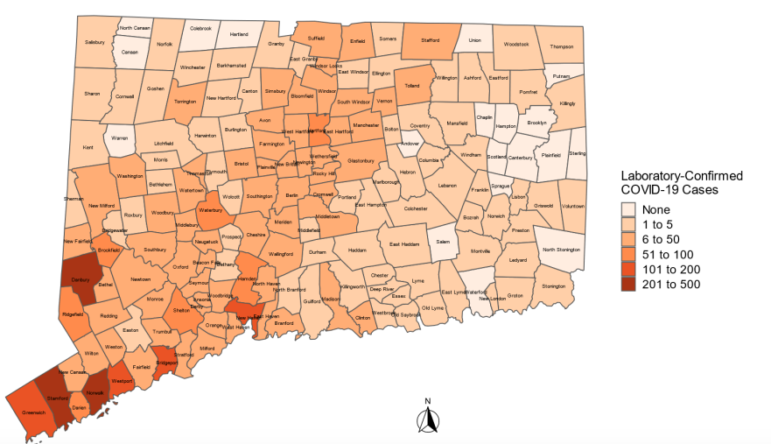
COVID-19 cases by town and city, April 1, 2020.
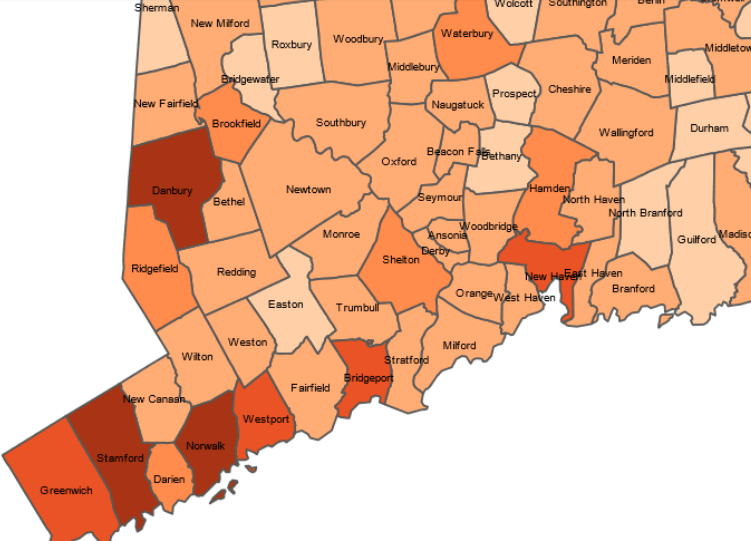
COVID-19 cases in southwestern Connecticut, as of April 1, 2020.
Gov Lamont’s WEDNESDAY COVID-19 Briefing
Wednesday, April 1, 9:43 p.m. — As the State of Connecticut continues taking actions in response to the global spread of coronavirus disease (COVID-19), Governor Ned Lamont provided the following updates as of 8:00 p.m. on Wednesday, April 1, 2020:
Data updates on testing in Connecticut
Since yesterday’s update, an additional 429 Connecticut residents have tested positive for COVID-19, bringing the statewide total to 3,557. To date, more than 16,600 tests have been conducted in Connecticut among both state and private laboratories. Approximately 766 patients have been hospitalized. The total statewide total number of fatalities is 85.
Among the new deaths to report is the first pediatric fatality linked to COVID-19 in Connecticut. This was a 6-week-old baby in the Hartford area who was brought unresponsive to a Connecticut hospital late last week and could not be revived. Post-mortem testing confirmed last night that the newborn was COVID-19 positive.
“The passing of this newborn is absolutely heartbreaking,” Governor Lamont said. “We believe this is one of the youngest lives lost linked to COVID-19. This virus attacks our most fragile populations without mercy, and we will definitely see some hard days ahead. This also stresses the importance of staying home and limiting your exposure to other people. Your life and the lives of those you love could literally depend on it. Our prayers are with this family at this difficult time.”
A county-by-county breakdown includes:
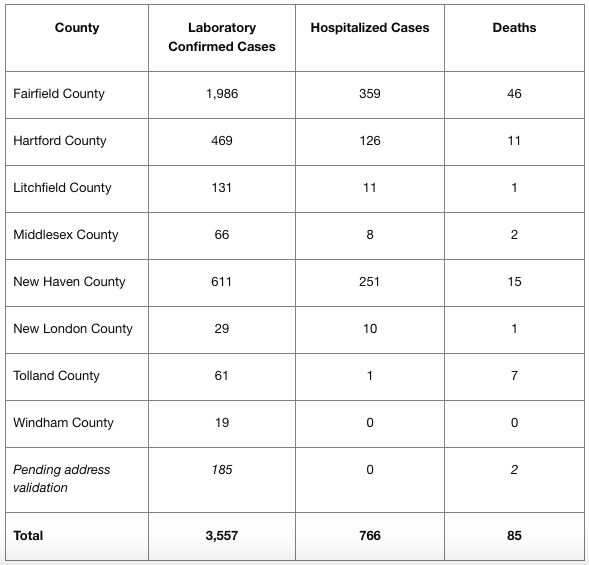
April 1 COVID-19 statistics
For several additional charts and tables containing more data groups, including a town-by-town breakdown of positive cases in each municipality and a breakdown of cases and deaths among age groups, visit ct.gov/coronavirus.
Governor Lamont signs 20th executive order to mitigate the spread of COVID-19
Governor Lamont today signed another executive order – the 20th since he enacted the emergency declarations – that builds upon his efforts to encourage mitigation strategies that slow down transmission of the virus.
Governor Lamont’s Executive Order No. 7S enacts the following provisions:
- Safe stores mandatory statewide rules: Effective upon the opening of each retail establishment for the first time on April 3, 2020, every retail establishment in the state will be required to take additional protective measures to reduce the risk of transmission of COVID-19 between and among customers, employees, and other persons such as delivery drivers and maintenance people. The order requires the commissioner of the Economic and Community Development to issue mandatory statewide rules prescribing such additional protective measures. Such rules will be mandatory throughout the state and supersede and preempt any current or contemplated municipal order.
- Immediately following Governor Lamont’s signing of this executive order, the Department of Economic and Community Development published the Safe Stores Rules on its website, outlining guidance for retail establishments. All stores must follow these rules beginning April 3.
- 60-day grace period for premium payments, policy cancellations, and non-renewals of insurance policies: Beginning on April 1, 2020 for a period of 60 days, no insurer in Connecticut – including life, health, auto property, casualty, and other types – may lapse or terminate a covered insurance policy because a policyholder does not pay a premium or interest during this time. This grace period is not automatic. To be eligible, affected policyholders must provide additional information acceptable to their insurance carriers.
- Extension of 30-day period of credit for liquor permittees: Modifies state law to permit the maximum period of credit for liquor permittees from certain creditors, including wholesalers and manufacturers, to be 90 days after the date of delivery for all permittees prohibited from engaging in on-premise sales per Executive Order No. 7D.
- Daily payment of certain taxes changed to weekly: Modifies the tax payment requirements for Sportech, the licensee authorized to operate off-track betting in Connecticut, from daily to weekly so that its employees aren’t required to appear in person daily.
- Flexibility to amend Medicaid waivers and state plan: In order to allow continued access to critical services for Medicaid beneficiaries, the order waives public notice and legislative hearing requirements for the duration of the declared public health and civil preparedness emergencies to allow the Department of Social Services to seek expedited approval from the Centers for Medicare and Medicaid Services to submit Medicaid waivers; amend existing Medicaid waivers; submit Medicaid State Plan Amendments that would have required a waiver but for the Affordable Care Act; and obtain relief from various other federal requirements on an emergency basis.
- Relief from certain municipal tax deadlines and collection efforts: Requires municipalities to enact one or both of two options for providing temporary tax forbearance of property tax collection and reduced interest on delinquent tax payments to property owners under certain conditions, including that landlords agree extend commensurate forbearance to commercial, residential, or institutional tenants for the duration of the deferment.
- Allow suspension of in-person voting requirements for critical and time sensitive municipal fiscal deadlines: Allows suspension of certain in-person votes of residents or taxpayers on certain fiscal decisions, in addition to the provisions in Executive Order No. 7I, for fiscal decisions needed to prevent property damage, protect public health and safety, or prevent significant financial loss, provided they comply with all open meeting requirements of Executive Order No. 7B.
- Suspension of reapplication filing requirement for the homeowners’ elderly/disabled circuit breaker tax relief program and for the homeowners’ elderly/disabled freeze tax relief program: Allows recipients of this benefit to receive the benefit for the coming year without recertifying their eligibility.
- Substitution of full inspection requirements pertaining to October 1, 2020 grand list revaluations: Allows 34 municipalities to continue with their scheduled 2020 revaluations, which are started up to a year in advance.The statute allows for Data Mailer Questionnaire to be mailed to the property owner when access is unobtainable; this eliminates having to request access, and allows for the revaluation to be completed via questionnaire.
- Extension of deadline to file income and expense statement to August 15: Allows taxpayers additional time to complete their income and expense statements.
- Suspension of non-judicial tax sales: Suspends foreclosures through non-judicial tax sales until 30 days after the end of the COVID-19 emergency.
| **Download: Governor Lamont’s Executive Order No. 7S |
Governor Lamont announces medical surge plan in collaboration with Connecticut’s long-term care facilities
Governor Lamont today announced that his administration is collaborating with Connecticut’s long-term care facilities on a medical surge plan that will involve moving some residents and the creation of dedicated spaces for residents who are COVID-19 positive.
As the number of individuals who are diagnosed with COVID-19 rises, the health care system will be stretched to extremes. Compounding this challenge is the fact that the elderly population will be at greater risk when diagnosed as being positive for COVID-19.
Nursing homes are an essential component of the medical surge plan. It includes the following options:
- Separation of COVID-19 positive residents: Anyone diagnosed as COVID-19 positive in a hospital and later admitted to a nursing home will be monitored and assessed for 14 days in an area that only has other COVID-19 positive residents. Anyone admitted who is negative for COVID-19 will be housed with other residents who are negative, as a mitigation measure.
- Dedication of space: Existing nursing homes will dedicate specific units that will group together residents who have been diagnosed as being COVID-19 positive, where applicable.
- Conversion of existing nursing homes: Residents of some long-term care facilities who either test negative for COVID-19 or display no symptoms will be able to voluntarily transfer to facilities where there are no COVID-19 positive residents. At the same time, some facilities will be converted to only house individuals who are COVID-19 positive and dedicate their new admissions to individuals who have been diagnosed positive. This concept also includes a facility who has a dedicated entrance to a unit within the structure that can physically isolate all care and services from normal operations. For existing nursing home conversions, individuals who are not positive for COVID-19 and/or asymptomatic will all be voluntarily transferred to the receiving destination prior to that facility accepting any individuals who are COVID-19 positive.
- Development of new alternate care sites: New spaces are identified that are currently vacant and in several cases have been vacated through recent nursing home closures. These sites would be licensed as chronic and convalescent nursing homes and the request would be made to the federal Centers for Medicare and Medicaid (CMS) for an 1135 waiver for rapid certification. These alternate care sites, too, would be dedicated to the care of individuals positive for COVID-19. Alternate care sites developed will be inspected and approved by the Department of Public Health (DPH). DPH can also provide support regarding access to and moving of equipment, staffing and logistics.
The Department of Social Services and the Office of Policy and Management have determined a specific payment rate for options 3 and 4. Options 3 and 4 would also require providers to submit a written proposal to DPH prior to approval that will need to address staffing patterns, equipment needs and detail system supports that will be provided such as environmental and food services, among others.
Options 3 and 4 will create additional bed space for 1,175 people. The following nursing homes have been identified as potential sites:
Option 3 (conversion of existing facilities)
- Evergreen Health Care (Stafford Springs, 180 Beds)
- Sharon Health Care (Sharon, 88 Beds)
- Touchpoints of Farmington (Farmington, 120 Beds)
- Touchpoints of Bloomfield (Bloomfield, 30 Beds)
- Greenwich Woods (Greenwich, 217)
- Total beds in option 3: 635
Option 4 (new alternate sites)
- Old Greenwich Civic Center (Greenwich, 90 Beds)
- Silver Hill Hospitals (New Caanan, 90 Beds)
- Westfield (Meriden, 120 Beds)
- Green Springs (East Hartford, 120 Beds)
- Vacant Nursing Home in Region 5 (120 Beds)
- Total beds in option 4: 540
The following is the list of nursing homes in Connecticut with residents who have tested positive for COVID-19 as of April 1, 2020 at 11:00 a.m.:
| Bloomfield | Bloomfield Healthcare Center |
| Bloomfield | Caleb Hitchcock Health Center |
| Bloomfield | Touchpoints at Bloomfield |
| Bridgeport | Jewish Living Center |
| Canton | Cherry Brook Health Care Center |
| Danbury | Glen Hill Center |
| East Haven | Whispering Pines Rehabilitation and Nursing Center |
| Greenwich | Greenwich Woods Rehabilitation |
| Greenwich | Nathaniel Witherell |
| Guilford | Guilford House |
| Milford | Golden Hill Rehab Pavilion |
| Naugatuck | Glendale Center |
| New Haven | Grimes Center |
| New London | Harbor Village Health and Rehabilitation |
| Newington | Bel-Air Manor |
| Portland | Portland Care and Rehabilitation |
| Rocky Hill | Apple Rehab Rocky Hill |
| Seymour | Shady Knoll Health Center |
| Sharon | Sharon Health Care Center |
| Shelton | Apple Rehab Shelton Lakes |
| Shelton | Bishop Wicke Health and Rehabilitation |
| Shelton | Gardner Heights Health Care Center |
| Stafford Springs | Evergreen Health Care Center |
| Stamford | St. Camillus Center |
| Suffield | Suffield House |
| Torrington | RegalCare at Torrington |
| Torrington | Wolcott Hall |
| Trumbull | Maefair Health Care Center |
| Waterbury | Abbott Terrace Health Center |
| Waterbury | RegalCare at Waterbury |
| Waterbury | Waterbury Gardens Nursing and Rehabilitation |
| Waterford | Bayview Health Care |
| Wilton | Wilton Meadows |
| Windsor | Kimberly Hall North |
| Windsor | Windsor Health and Rehabilitation |
| Woodbridge | The Willows |
Connecticut National Guard deploys additional medical capacity at Middlesex Hospital, SCSU, and WCSU
The Connecticut National Guard today continued efforts to deploy additional medical capacity at several sites throughout the state:
- A Connecticut Department of Public Health mobile field hospital was set up at Middlesex Hospital in Middletown. This is the third of these units to be deployed at hospitals across the state. Last week, the Guard deployed two other of these units at Saint Francis Hospital in Hartford and Danbury Hospital.
- The Guard today also deployed a 250-bed medical station provided by FEMA at the Moore Field House on the campus of Southern Connecticut State University in New Haven.
- In addition, the Guard today began preparations to set-up 300 beds of additional medical capacity from the Connecticut Division of Emergency Management and Homeland Security at the O’Neill Center on the campus of Western Connecticut State University in Danbury. Those beds will be assembled on Thursday.
Governor Lamont announces creation of 4-CT charitable organization to unite donors with Connecticut programs responding to COVID-19
Recognizing the considerable demand on resources the COVID-19 public health emergency is having on nearly every aspect of life across the state, a group of Connecticut-based philanthropists today announced that they have established a charitable organization to raise new support for the state’s nonprofit organizations that are serving those impacted by the pandemic.
The Connecticut COVID-19 Charity Connection – also known as 4-CT – is an independent, 501(c)3 organization with the mission of bolstering the resources available to support the state’s frontline providers who are serving all areas impacted by the crisis. 4-CT will provide financial support to ensure their services can meet increased demand and have a positive impact.
In announcing its launch, the charity has already raised $10 million from generous donors and is seeking to significantly increase these efforts in the coming weeks and months to further support to the state’s nonprofit community.
Governor Ned Lamont, recognizing the urgency of addressing the impact of the crisis on communities across the state, said the creation of this charity is an example of Connecticut ingenuity and generosity, and applauded the efforts of those who sought to bring it to fruition.
“I’m grateful to our community foundations, United Way of Connecticut, and the individual donors who support the work of nonprofits that provide critical services across our state every day – and during this crisis,” Governor Lamont said. “4-CT will expand the ranks of these philanthropic partners supporting the nonprofits on the frontlines.”
For more information, read the press release issued today by Governor Lamont. [SEE: New Charity Formed to Support Connecticut Nonprofits Helping Those Impacted by COVID-19 (April 1)]
State Parks to reduce visitor capacity during COVID-19 pandemic
Pursuant to Executive Order No. 7R, which Governor Lamont signed Tuesday, the Connecticut Department of Energy and Environmental Protection (DEEP) today announced that it will be enforcing stricter measures to support safe, solitary enjoyment of outdoor spaces at all state parks in an effort to maintain social distancing. This include plans to limit parking capacity at certain parks to manage visitor levels.
While state parks remain open for solitary recreation, the agency is closely monitoring park visitorship and is closing parking lots when lots become full and lowering parking thresholds where necessary.
In some locations, additional visitors have been observed parking outside of park entrances that have been closed for capacity and walking in, which undermines DEEP’s ability to maintain manageable visitor levels.
The executive order Governor Lamont signed gives DEEP the authority to impose penalties on individuals who enter parks after they have reached capacity.
Those considering visiting state parks are encouraged to take these steps:
- Check the Connecticut State Park’s Twitter account at @CTStateParks, where real-time information on park closures is announced;
- Stay home if you’re not feeling well; and
- Rather than traveling to the more popular spots, discover a new place that is less traveled. Check out DEEP’s website for a list of every State Park and use the hashtag #CTTrailsLessTraveled on social media.
For more information, read the press release issued today by DEEP.
Connecticut State Colleges and University system donates PPE to facilities across the state
Higher education institutions from within the Connecticut State Colleges and University (CSCU) system have been making donations of PPE [Personal Protective Equipment] from their facilities to local hospitals to assist with emergency response.
“There are so many ways each of us can help out in some way, and I applaud these higher education institutions for utilizing their resources and giving them to our local hospitals, which are in need of this equipment at this time,” Governor Lamont said.
PPE donations from each CSCU institution to date includes:
- Central Connecticut State University: Total Gloves Combined, 26,000; Total Masks Combined, 430
- Eastern Connecticut State University: Total Masks Combined, 1,200
- Western Connecticut State University: Total Gloves Combined, 400; Total Masks Combined, 1,550; Total Gowns Combined, 174
- Charter Oak State College: Total Gloves Combined, 1,800; Total Masks Combined, 21
- Tunxis Community College: Total Gloves Combined, 15,600; Total Masks Combined, 838; Total Eye Protection Combined, 48; Total gowns, 60
- Middlesex Community College: Total Gloves Combined, 25,300; Total Masks Combined, 560
- Norwalk Community College: Total Gloves Combined, 15,000; Total Masks Combined, 919; Total Gowns Combined, 130; Total Alcohol Prep Pads Combined, 1,800; Total Ventilators Combined (on loan), 3
- Three Rivers Community College: Total Gloves Combined, 5,700; Total Masks Combined, 2,000 Total Gowns Combined, 189
- Northwestern Connecticut Community College: Total Gloves Combined, 15,100; Total Masks Combined, 1,890; Total Gowns Combined, 211
- Manchester Community College: Total Ventilators Combined, 6
- Housatonic Community College: Total Gloves Combined, 300; Total Masks Combined, 200; Total Gowns Combined, 120
- Naugatuck Valley Community College: Total Gloves Combined, 28,400; Total Masks Combined, 200; Total Gowns Combined, 510
- Quinebaug Valley Community College: Total Gloves Combined, 23,100; Total Masks Combined, 525; Total Gowns Combined, 85
- Capital Community College: Total Gloves Combined, 27,700; Total Masks Combined, 1,012; Total Gowns Combined, 406
- CSCU System Totals: Gloves: 184,400; Masks: 11,345; Gowns: 1,885; Ventilators: 9
Providing information to Connecticut residents
For the most up-to-date information from the State of Connecticut on COVID-19, including an FAQ and other guidance and resources, residents are encouraged to visit ct.gov/coronavirus.
Individuals who have general questions that are not answered on the website can also call 2-1-1 for assistance. The hotline is available 24 hours a day and has multilingual assistance and TDD/TTY access. It intended to be used by individuals who are not experiencing symptoms but may have general questions related to COVID-19. Anyone experiencing symptoms is strongly urged to contact their medical provider.
Superintendent Premiers Online ‘Dr Addley’s Neighborhood’ for Kids
Darien Public Schools Superintendent Alan Addley has started a video show for young kids, modeled on “Mr. Rogers’ Neighborhood.” It includes some puppets and a reading of Shel Silverstein’s “The Giving Tree.” Here’s the first episode of “Dr. Addley’s Neighborhood,” running just over 8 minutes and posted Tuesday on the district website:
Where Identified COVID-19 Cases Are in Lower Fairfield County
Wednesday, April 1, 10:13 a.m. — As of Tuesday, 69 Darienites have been identified with COVID-19. (Reminders: Many people are thought to have the COVID-19 virus who aren’t identified; the state says “all figures are preliminary and subject to change.”) Here’s the number of identified cases in nearby communities, according to the state government Coronavirus statistics updates Web page:
Greenwich — 149 (fourth highest number in CT — Danbury, at 223, is third)
Stamford — 401 (highest number in CT)
Norwalk — 302 (second highest in CT)
New Canaan — 41
Wilton — 49
Westport — 120 (sixth highest in CT — New Haven, fifth, has 121)
Weston — 29
Ridgefield — 77
Fairfield — 40
Bridgeport — 86
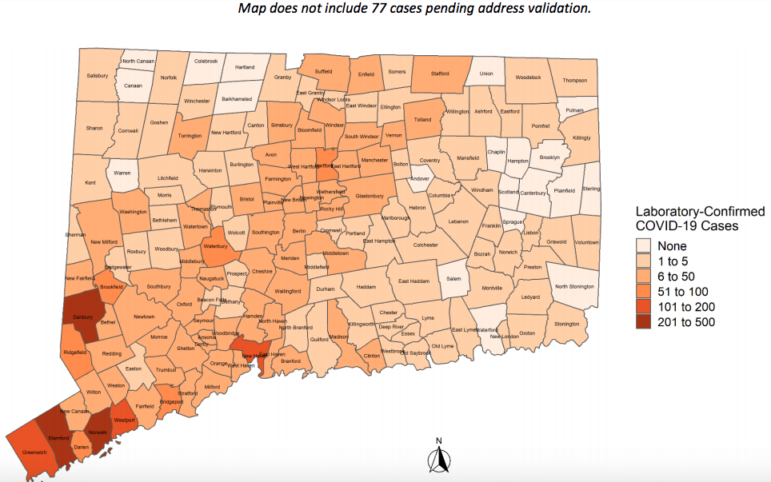
Statewide spread of identified COVID-19 cases, town by town, as of March 31.

Southwest CT COVID-19 identified cases as of Tuesday, March 31.
Age Range of Identified COVID-19 Cases, Deaths So Far in Connecticut
Wednesday, April 1, 10:13 a.m. — From the state COVID-19 statistics update Web page:


COVID-19 deaths in Connecticut, by age group, as of Tuesday, March 31, 2020.
Easter Orders Deadline Monday at Palmer’s Market
Wednesday, 9:48 a.m. — An announcement from Palmer’s Market about ordering food in time for Easter:
We all know that Easter is going to be a little bit different this year, but it can still be delicious. Orders are closing early this year, so be sure to place your order by Monday, April 6 at 5 p.m.
In order to avoid lines and limit the number of people in the store, we will be offering curbside pick-up for all Catering Easter Orders.
All orders must be fully paid for in advance.
We will be offering a limited number of pick-ups per hour and request that you come during your scheduled pick-up window.
[From the Palmer’s website “Easter Menus” Web page: “This menu is available to be picked up curbside on Friday, April 10 or Saturday April 11. For all other dates, please view our Gourmet-To-Go Menu.”]
Butcher Shop orders for Spiral Sliced Hams, Australian & American Lamb, Pork and Beef can be placed by calling (203) 655-2077 Ext 1.
Maritime Aquarium: ‘Register for This Week’s Virtual Programs!’
8:53 p.m., Tuesday, March 31 — On Tuesday, the Maritime Aquarium sent out a list of the educational programs it’s now offering online. Here’s part of the announcement, with information on programs Wednesday through Friday:
In response to the COVID-19 closures, we will be streaming some of our most popular educational programs each week!
Students, families and individuals are welcome to take part in these live-streaming virtual programs. All programs require advance reservations to receive the needed link.
Wednesday, April 1
—Fish Tales (Toddler – Grade 3) at 10 a.m.
Thursday, April 2
—Meet the Captain (Grades 6-12) at 4 p.m.
Friday, April 3
—Fish Tales (Toddler – Grade 3) at 11 a.m.
—Water Pollution (Grades 3-7) at 4 p.m.
Upcoming Facebook Q&As:
Don’t miss our live Q&A sessions at 3 p.m. daily on our Facebook page:
—Wednesday, April 1: Sharks
—Thursday, April 2: Jellies
—Friday, April 3: Seals
Gov. Lamont’s Tuesday Announcements
March 31, 8:32 p.m. — Gov. Lamont’s latest update includes information on efforts to help school district financing, rising numbers of positive test results for COVID-19 and hospitalizations for it (almost all in Fairfield, New Haven and Hartford counties), and a program to provide mortgage payments relief:
Governor Ned Lamont provided the following updates as of 7:00 p.m. on Tuesday, March 31, 2020:
Data updates on testing in Connecticut
Since yesterday’s update, an additional 557 Connecticut residents have tested positive for COVID-19, bringing the statewide total to 3,128. To date, more than 15,600 tests have been conducted in Connecticut among both state and private laboratories. Approximately 608 patients have been hospitalized. The total statewide total number of fatalities is 69.
In addition to the deaths related to COVID-19 that have been reported to the Department of Public Health (DPH), this update contains information on the number of deaths that have been reported to the Office of the Chief Medical Examiner (OCME).
Today, the OCME provided information on 14 additional COVID-19 related deaths that occurred during March 17 to 29. There were 16 COVID-19 related deaths on March 30, and 3 on March 31.
Moving forward, deaths reported to the either the OCME or DPH will be included in the daily COVID-19 update. All data in this report are preliminary; data for previous dates will be updated as new reports are received and data errors are corrected. Hospitalization data were collected by the Connecticut Hospital Association.
A county-by-county breakdown includes:
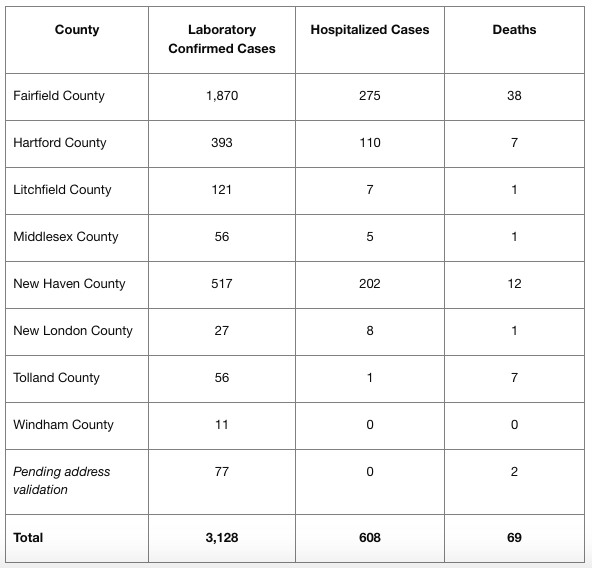
For several additional charts and tables containing more data groups, including a town-by-town breakdown of positive cases in each municipality and a breakdown of cases and deaths among age groups, visit ct.gov/coronavirus.
Governor Lamont signs 19th executive order to mitigate the spread of COVID-19
Governor Lamont today signed another executive order – the 19th since he enacted the emergency declarations – that builds upon his efforts to encourage mitigation strategies that slow down transmission of the virus.
Governor Lamont’s Executive Order No. 7R enacts the following provisions:
- Continuation of funding for boards of education [Darienite.com editor’s note: They mean school districts]: The order requires the Connecticut State Department of Education to continue processing appropriated state grant funds intended to support boards of education through the fiscal year ending June 30, 2020, including ECS grants, payments for special education, and Choice programming. It also requires municipalities to continue providing funding to local boards of education as set forth in the approved annual school budgets.
- Continuation of payment of public school staff: The order requires school districts to continue to employ, or restore to employment if already laid off, and pay school staff who are directly employed by the local or regional boards of education.
- Preservation of student transportation services and special education providers: The order requires local boards of education and municipalities to negotiate amendments to contracts related to student transportation and special education services with the goal of continuing to make payments to transportation and special education providers so they may compensate their active employees, sustain the continuity of service when school resumes, and require the contracted company to attest and provide reasonable documentation of the fact that it is charging only the actual and reasonable cost of sustaining wage and health insurance payments for active employees and fleet.
- Restrictions on entrance to state parks, forests, and other lands: In light of significant visitors to certain state parks in recent days, the order gives the commissioner of Energy and Environmental Protection the authorization to ban visitors from entering state parks and other lands under the agency’s control after the property has reached a capacity adequate to supporting implementation of social distancing policies to limit the spread of COVID-19.
- Curbside pickup of alcoholic beverages permitted: The order authorizes package stores and grocery stores to permit the sale of curbside pickup of all alcoholic beverages allowed by their permit type in any space adjacent to their permit premise and during the days and hours allowed for legal sale.
| **Download: Governor Lamont’s Executive Order No. 7R |
Connecticut National Guard deploys federal mobile medical station at Southern Connecticut State University
The Connecticut National Guard today activated 150 personnel to the campus of Southern Connecticut State University in New Haven to help with staging and unloading a mobile medical station provided to the state by the U.S. Department of Health and Human Services. The Guard’s mission deploying the station on the campus will continue Wednesday.
Governor Lamont reaches agreement with banks and credit unions to provide mortgage payment relief
Governor Lamont today announced that his administration has reached an agreement with over 50 credit unions and banks in Connecticut to offer mortgage relief to the state’s residents and businesses who continue to face hardship caused by the global COVID-19 pandemic. Under the agreement, the following relief policies are being offered by participating financial institutions:
- 90-day grace period for all mortgage payments: Participating financial institutions are now offering mortgage-payment forbearances of up to 90 days, which will allow homeowners to reduce or delay monthly mortgage payments. In addition, the institutions will:
- Provide a streamlined process for requesting forbearance for COVID-19-related reasons, supported with available documentation;
- Confirm approval and terms of forbearance program; and
- Provide the opportunity to extend forbearance agreements if faced with continued hardship resulting from COVID-19.
- Relief from fees and charges for 90 days: For at least 90 days, participating financial institutions will waive or refund mortgage-related late fees and other fees including early CD withdrawals.
- No new foreclosures for 60 days: Financial institutions will not start any foreclosure sales or evictions.
- No credit score changes for accessing relief: For those taking advantage of this COVID-19-related relief, late or missed payments will not be shared with credit reporting agencies.
The agreement, which was negotiated on behalf of the Lamont administration by Commissioner Jorge Perez at the Connecticut Department of Banking, builds upon similar initiatives that have been enacted in recent days in California and New Jersey, and has been endorsed by the Connecticut Bankers Association and the Credit Union League of Connecticut.
More than 50 credit unions and banks statewide are participating, including Webster Bank, American Eagle Financial Credit Union, Liberty Bank, Charter Oak Federal Credit Union, Bank of America, Nutmeg State Financial Credit Union, and Peoples United Bank.
Additional financial institutions are expected to join the initiative in the coming days. The Department of Banking will maintain updated list of participating institutions on its website.
“This agreement with our financial institutions will allow Connecticut residents to obtain some relief as this public health emergency has had an impact on thousands of people in our state,” Governor Lamont said. “I thank each of these financial institutions that will provide this relief and applaud their participation in this agreement. The way we are going to get through this crisis is by working together, and this is an example of how we are going to get that done.”
For more information, read the press release issued today by Governor Lamont.
Office of Health Strategy further streamlines approval process for additional hospital beds
To further streamline the approval process for additional hospital beds to accommodate a growing number of seriously ill COVID-19 patients, the Connecticut Office of Health Strategy (OHS) today released revised guidance and is now including outpatient surgical facilities among those required to simply complete a notification form, rather than apply for a Certificate of Need (CON) waiver.
The intent is to accelerate implementation of emergency planning to address the COVID-19 crisis, approve expanded facilities to meet urgent demand, and still provide OHS a mechanism to track changes. OHS is providing the state’s hospitals and outpatient surgical facilities with a revised form to submit to the agency when seeking to perform these actions.
As before, once the state’s public health emergency is lifted, all temporary approvals will be rescinded and the full statutory, CON process will be restored.
Providing information to Connecticut residents
For the most up-to-date information from the State of Connecticut on COVID-19, including an FAQ and other guidance and resources, residents are encouraged to visit ct.gov/coronavirus.
Individuals who have general questions that are not answered on the website can also call 2-1-1 for assistance. The hotline is available 24 hours a day and has multilingual assistance and TDD/TTY access. It intended to be used by individuals who are not experiencing symptoms but may have general questions related to COVID-19. Anyone experiencing symptoms is strongly urged to contact their medical provider.
Federal Resources for Employers, Employees
Tuesday, March 31, 10:33 a.m. —Part of an emailed announcement from U.S. Sen. Chris Murphy’s office on Monday with links to information on current federal resources for employers and employees during the COVID-19 pandemic:
At the end of last week, the Coronavirus Aid, Relief, and Economic Security (CARES) Act – a third COVID-19 relief package was signed into law. This bill focuses on support for workers, families, hospitals and their staff, small businesses, and the unemployed during this crisis.
To help answer some of the many questions about what is in the CARES Act and how you may get assistance, our office has put together an FAQ, which can be found here. If you are a small business owner, a separate detailed guide is also available – click here.
Lastly, the U.S. Department of Labor is providing compliance assistance to employers and employees on their responsibilities and rights under the Families First Coronavirus Response Act. Helpful information here.
Gov’s Monday Announcement of COVID-19 Efforts
Monday, March 30, 8:31 p.m. — Gov. Ned Lamont’s office issued an announcement with the state’s latest COVID-19 mitigation efforts. Some of what was mentioned:
The rest stop on the Merritt Parkway in New Canaan has been closed due to lack of demand
Here’s the announcement:
As the State of Connecticut continues taking actions in response to the global spread of coronavirus disease (COVID-19), Governor Ned Lamont provided the following updates as of 7:00 p.m. on Monday, March 30, 2020:
Data updates on testing in Connecticut
Since yesterday’s update, an additional 578 Connecticut residents have tested positive for COVID-19, bringing the statewide total to 2,571. To date, more than 14,600 tests have been conducted in Connecticut among both state and private laboratories. Approximately 517 people have been hospitalized. There have been another two fatalities due to complications of COVID-19, bringing the statewide total number of fatalities to 36.
A county-by-county breakdown includes:
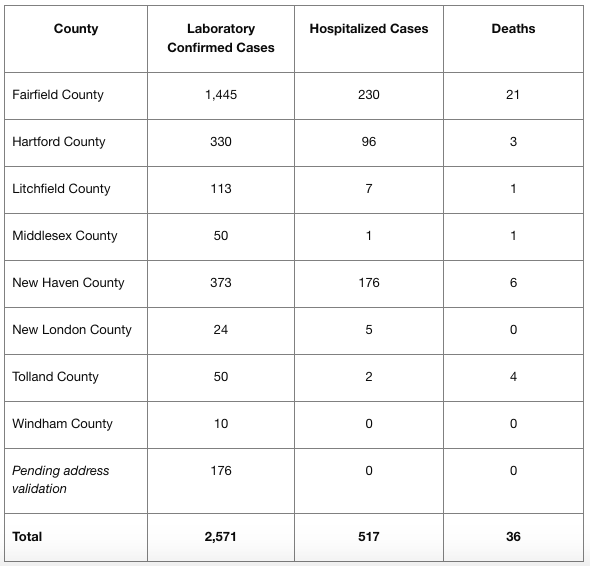
For several additional charts and tables containing more data groups, including a town-by-town breakdown of positive cases in each municipality and a breakdown of cases and deaths among age groups, visit ct.gov/coronavirus.
Governor Lamont signs 18th executive order to mitigate the spread of COVID-19
Governor Lamont today signed another executive order — the 18th since he enacted the emergency declarations — that builds upon his efforts to encourage mitigation strategies that slow down transmission of the virus.
Governor Lamont’s Executive Order No. 7Q enacts the following provisions:
- Requirement of limited group sizes in childcare: The order requires all childcare facilities to limit group sizes to no more than 10 children in one space. Any facility caring for more than 30 children must obtain approval from the Office of Early Childhood and demonstrate sufficient separation of groups within the facility. This applies to all childcare facilities, including those that are exempt from licensing requirements.
- Enhancement of health procedures for all operating childcare programs: The order requires all children and childcare staff to be checked at the entrance of childcare facilities for any observable illness, including cough or respiratory distress, and to confirm temperature below 100 degrees Fahrenheit. All staff must adhere to increased handwashing and health practices. Enhanced cleaning and disinfection practices shall be implemented. This applies to all childcare facilities, including those that are exempt from licensing requirements.
- Authorization of remote notarization: The order eliminates all existing legal requirements to have a signature on any document witnessed by a third party, except in the case of a last will and testament. With respect to last wills and testaments, documents may now be witnessed remotely under the supervision of an attorney. In addition to removing witness requirements, any document required to be filed on the land records must contain a one-page certification, completed by a notary or commissioner of the Superior Court, reciting to the fact that the underlying document was executed pursuant to the executive order.The order also requires all town and city clerks to accept those documents for recording.
| **Download: Governor Lamont’s Executive Order No. 7Q |
Governor Lamont forms the Governor’s Health System Response Team to coordinate response for hospitals
Governor Lamont today announced that he is forming the Governor’s Health System Response Team, which will consist of the CEOs from three of Connecticut’s largest hospital systems: Hartford HealthCare, Nuvance Health, and Yale New Haven Health.
The team, in coordination with the Connecticut Hospital Association and the state’s other hospitals, will be responsible for advising the governor, the Department of Public Health and the rest of the state’s Emergency Support Functions in the Unified Command structure on the proper allocation and distribution of needed resources, supplies, and personnel, throughout the duration of the public health emergency.
This group has already been consulting on a regular basis with the Lamont administration prior to the confirmation of the first positive case in the state, and that work will provide the foundation of the plans and actions as the state’s health care system handles an expected surge of COVID-19 cases.
“Our state is going to get through this by working together, and that includes making sure our hospitals are at the table working directly with my administration to ensure they have access to the resources they need,” Governor Lamont said.
“These are experts in the healthcare field and our state is incredibly fortunate to have such experience providing counsel as we look to keep as many of our residents safe and healthy as possible.”
For more information, read the press release issued today by Governor Lamont.
U.S. Department of Homeland Security to provide financial support for Governor Lamont’s activation of the Connecticut National Guard
The U.S. Department of Homeland Security today informed the Lamont administration that it will provide 100 percent reimbursement for the costs associated with activating the Connecticut National Guard to provide the state with support in its COVID-19 emergency response.
Governor Lamont activated the Guard prior to the first confirmation of a positive case in the state. This is a state activation of the Guard, meaning that Governor Lamont will continue to command Connecticut National Guard forces through Connecticut’s Adjutant General and Joint Staff.
To date the Connecticut Military Department and National Guard has:
- Deployed two of Department of Public Health’s mobile field hospitals at Saint Francis Hospital in Hartford and Danbury Hospital, with a third on the way at Middlesex Hospital in Middletown;
- Provided climate-controlled tents to two VA hospitals in West Haven and Newington;
- Used their Guardsmen that work for major logistics companies to begin managing a warehouse to receive and distribute essential supplies;
- Distributed protective masks, gowns, and face shields to healthcare workers and first responders; and
- Provided medical planners to work with the Department of Public Health to find ways to surge bed capacity and do predictive analysis on how many people the virus will affect.
This week they plan to:
- Deploy the Federal Medical Station with a capacity of 250 beds;
- Convert large spaces at Southern Connecticut State University, Western Connecticut State University, and Webster Bank Arena in Bridgeport into medical surge capacity with approximately 300 beds at each site; and
- Deploy the third Department of Public Health mobile field hospital at Middlesex Hospital.
Public Health commissioner orders suspension of license renewals and payment of associated fees during pandemic
Department of Public Health (DPH) Commissioner Renée D. Coleman-Mitchell today issued an order suspending the need for all DPH licensees to renew their licenses throughout the duration of the declared COVID-19 emergency. This applies to all licenses the agency administers, including those for health care facilities and practitioners.
Licensees will not be required to pay the fees associated with the renewals during this time but will be required to pay such fees retroactively when the period of license renewal suspension is over. All active licenses will remain active throughout the duration of the declared emergency.
In addition, the commissioner issued a separate order today temporarily modifying the authority of subregistrars of vital statistics, who are appointed by the local registrars of vital statistics, allowing them to issue burial transit, removal, and cremation permits for any death occurring in any town within the state for the duration of the public health and civil preparedness emergency.
One limitation requires that any subregistrar who is an embalmer or funeral director may not issue a cremation permit for a deceased for whom he or she is performing funeral services.
Department of Revenue Services extends filing and payment deadlines for certain small businesses
At the direction of Governor Lamont to provide Connecticut small businesses with immediate administrative tax relief in recognition of the impact of COVID-19, the Department of Revenue Services (DRS) today announced that it granting a two-month extension of filing and payment deadlines for certain small businesses.
“The state needs to be taking all steps possible to provide relief to our small businesses, and this is a prudent step during this public health emergency,” Governor Lamont said.
Taxpayers that have $150,000 or less in annual sales tax liability qualify for an automatic extension of time to file and pay. Similarly, those that have $150,000 or less in annual room occupancy tax also qualify for this relief. Entities that collect both sales tax and room occupancy tax must evaluate each tax separately to determine eligibility for relief.
To determine if it is a qualified small business, entities are required to utilize a calendar year look back period of January 1, 2020 through December 31, 2019. Any taxpayer that reported $150,000 or less in tax during that period qualified for the relief.
Returns covered by this extension includes:
- For monthly sales tax and room occupancy tax filers: Returns and payments due March 31, 2020, and April 30, 2020, are extended to May 31, 2020.
- For quarterly sales tax and room occupancy tax filers: Returns and payments due April 30, 2020, are extended to May, 31, 2020.
“DRS acknowledges that small businesses may need additional time to access their records and consult with their tax preparer,” Acting Revenue Services Commissioner John Biello said. “Taxpayers who file and pay on or before the extended deadlines will not be subject to any penalties or interest.”
Department of Transportation works to ensure service plazas remain open for essential drivers, closes two service plazas on Route 15 due to lack of demand
The Connecticut Department of Transportation has been working with service plaza operators to keep the plazas open as much as possible, with a priority on I-95, in order to serve trucks that are delivering needed supplies to the state.
Service plazas on I-95 and I-395 remain open for truckers and essential motorists. Due to lack of demand, the rest areas on Route 15 in Orange and New Canaan have been closed effective today until further notice.
Number of health care professionals registering to volunteer with the state doubles over the weekend
The number of health care professionals who have registered with the state to volunteer their services has doubled over the weekend, reaching a total of 2,079 people who have notified the state expressing interest in volunteering. On Saturday, Governor Lamont released a PSA asking health care professionals – including students and those who are retired – to register with a state database administered by the Department of Public Health, and their services will be matched with Connecticut medical facilities in need. Those interested in volunteering can register online at ctresponds.ct.gov.
“We are seeing Connecticut ingenuity and generosity in action, and I cannot tell you how much we appreciate everyone who is helping out their neighbors in need,” Governor Lamont said.
Attorney General Tong and Consumer Protection Commissioner Seagull warn of potential COVID-19 stimulus check scams
Attorney General William Tong and Connecticut Department of Consumer Protection Commissioner Michelle Seagull are warning Connecticut residents to be on the lookout for potential scams involving future stimulus checks from the federal government. After the federal government enacted a $2 trillion economic stimulus package in response to the COVID-19 pandemic, the state officials’ two offices are beginning to receive reports of bad actors looking to steal American’s personal information and money.
Residents should follow these tips to prevent falling victim to a scam artist:
- The federal government will not ask you to pay money upfront to receive a stimulus check. No fees. No charges.
- The federal government will never call to ask for your Social Security number, bank account or credit card number. Anyone who asks for this personal identifying information is a scammer.
- No matter how the payment is disbursed, only a scammer will ask you to pay to receive it.
For more information, read the press release issued today by the Attorney General and Department of Consumer Protection.
Connecticut receives $5.4 million in federal funding under CARES Act for voting security and safety
Secretary of the State Denise Merill and the members of Connecticut’s Congressional delegation today announced that the State of Connecticut is receiving $5.4 million in federal funding from the Coronavirus Aid, Relief, and Economic Security (CARES) Act that will be used to enhance the safety of in-person voting in polling places, expand vote at home mail-in voting, and protect the security and integrity of the election and the counting of ballots. The CARES Act is providing $400 million to the states, appropriated based on population, to prepare for the impact of the coronavirus on the 2020 election cycle. The virus is forcing states to take new measures to protect the integrity of voting systems and access to the ballot box.
Earlier this month, Governor Lamont signed an executive order using his emergency authority postponing Connecticut’s presidential primary from April 28 to June 2.
For more information, read the press release issued by Secretary Merrill today.
Providing information to Connecticut residents
For the most up-to-date information from the State of Connecticut on COVID-19, including an FAQ and other guidance and resources, residents are encouraged to visit ct.gov/coronavirus.
Individuals who have general questions that are not answered on the website can also call 2-1-1 for assistance. The hotline is available 24 hours a day and has multilingual assistance and TDD/TTY access. It intended to be used by individuals who are not experiencing symptoms but may have general questions related to COVID-19. Anyone experiencing symptoms is strongly urged to contact their medical provider.
Monday, March 30, 5:01 p.m.:
Opportunity for Girls 12 to 18: ‘Girls With Impact’
From Monday’s Middlesex Middle School Parents Association newsletter:
GIRLS WITH IMPACT: KEEP YOUR DAUGHTER LEARNING FROM HOME – 100% LIVE, ONLINE ACADEMY MADE FREE SPRING CLASSES FOR GIRLS 12-18.
To ease the burden of school and extracurricular activity closures, Girls With Impact is offering its ‘mini MBA’ program for FREE (valued at $2K) to girls 12-18 across the USA.
Keep her learning and getting ahead through our 8-class live, online academy and watch her launch her own venture, business or community project.
Register now at https://www.girlswithimpact.org/application/register-for-academy-program-covid
Website: www.girlswithimpact.org Classes start March 31.
NOW CLOSED: Waveny Park, Other New Canaan Parks, School Campuses
An announcement similar to Darien’s on closed parks: This is from New Canaan Emergency Management Director Mike Handler on Monday, March 30 (today):
“First Selectman Kevin Moynihan has just signed an Emergency Order closing all town and public school parks and fields. This order is effective immediately through April 30. These actions are being taken to ensure that our message is absolutely clear—there should be zero social gathering. This may be received poorly by some; unfortunately, it is necessary to save lives.”
Excerpts from Gov Lamont’s Sunday Announcements
—Major disaster declaration approved for Connecticut
Governor Lamont’s request for a presidential major disaster declaration for the State of Connecticut in response to the COVID-19 pandemic was approved today, unlocking additional federal assistance programs for the state.
Today’s approval is for public assistance, meaning that impacted state agencies and municipalities in all eight counties will be reimbursed for 75 percent of the costs associated with their response and emergency protective measures. The governor’s other request for disaster assistance, including individual assistance that could provide Connecticut residents with a number of critical benefits, such as expanded unemployment assistance, food benefits, and child care assistance, remains under review by the White House.
For more information, read the press release Governor Lamont issued today.
—Governor Lamont places order for 100 ventilators with Guilford manufacturing company Bio-Med Devices
This morning Governor Lamont visited the headquarters of Bio-Med Devices in Guilford, where he toured the manufacturing facility and executed a purchase order for 100 ventilators that will be used in hospitals throughout Connecticut. Employees at the company have been working seven days a week to keep up with demand.
“We’re working every day to ensure that our state’s hospitals have access to the resources they need to keep our residents safe and healthy, and I am proud that we are partnering with a company like Bio-Med Devices that will provide our hospitals with a critical resource that we need at this time,” Governor Lamont said.
—Department of Public Health commissioner orders homeless population moved into less congested housing, directs development of temporary housing for certain first responders and health care workers
Pursuant to Governor Lamont’s Executive Order No. 7P, which was issued yesterday evening, Department of Public Health Commissioner Renée D. Coleman-Mitchell late Saturday night issued an order directing state, local, and private sector partners to transition the homeless population into alternative, less congested housing for the purpose of providing adequate social distancing between all individuals. The goal is to decompress the current population by providing less populated settings.
The order also requires the development of non-congregate temporary housing for first responders and health care workers who are at reasonable risk of having been exposed to COVID-19 and cannot return to their usual residence because of the risk of infecting other household members.
FEMA has notified the State of Connecticut that it will reimburse the state and municipalities for 75 percent of the costs related to the non-congregate housing for the homeless population, as well as first responders and health care workers.
For more information, read Commissioner Coleman-Mitchell’s order.
—Providing information to Connecticut residents
For the most up-to-date information from the State of Connecticut on COVID-19, including an FAQ and other guidance and resources, residents are encouraged to visit ct.gov/coronavirus.
Individuals who have general questions that are not answered on the website can also call 2-1-1 for assistance. The hotline is available 24 hours a day and has multilingual assistance and TDD/TTY access. It intended to be used by individuals who are not experiencing symptoms but may have general questions related to COVID-19. Anyone experiencing symptoms is strongly urged to contact their medical provider.
Governor Major Disaster Declaration Approved
An announcement from Governor Lamont’s office on Sunday morning:
Governor Ned Lamont today announced that he has been notified by the Federal Emergency Management Agency (FEMA) that his request for a Major Disaster Declaration for the State of Connecticut in response to the COVID-19 pandemic has been approved, unlocking additional federal assistance programs for the state.
Today’s approval is for public assistance, meaning that impacted state agencies and municipalities in all eight counties will be reimbursed for 75 percent of the costs associated with their response and emergency protective measures.
The governor’s other request for disaster assistance, including individual assistance that could provide Connecticut residents with a number of critical benefits, such as expanded unemployment assistance, food benefits, and child care assistance, remains under review by the White House.
“I am grateful that the federal government is recognizing the severity of this pandemic in Connecticut and the impact it is having on the health and safety of the people of our state. It is an important step in providing critical aid in our communities,” Governor Lamont said. “I remain hopeful that our request for assistance for individuals will also be approved because this pandemic has had a significant impact on the livelihoods of so many people in Connecticut. Thousands of workers and families are badly hurting. Unlocking this assistance would mean expanded unemployment benefits for those who are out of work because of the emergency, needed food benefits, child care assistance, and a host of other critically important aid.
“This funding is imperative to protecting the health and safety of the people of our state and further limiting the spread of this disease. I am grateful to our entire Congressional delegation who vigorously advocated for this declaration on our behalf. We will continue doing everything in our power to minimize both the health threat and the economic threat of this virus.”
Governor Issues Call for CT Health Care Volunteers
An announcement Saturday from the Governor’s Office:
Governor Lamont films PSA asking for health care professionals to volunteer in COVID-19 effort
Governor Lamont today released a PSA video asking health care professionals – including students and those who are retired – to consider helping Connecticut’s medical facilities in the COVID-19 effort by volunteering their services. Those interested in volunteering can register online at ctresponds.ct.gov and they will be matched with a health care facility that is in need.
Media outlets statewide are encouraged to use the PSA on their platforms and help spread this important public health message. The Office of the Governor thanks every media outlet for their teamwork.

